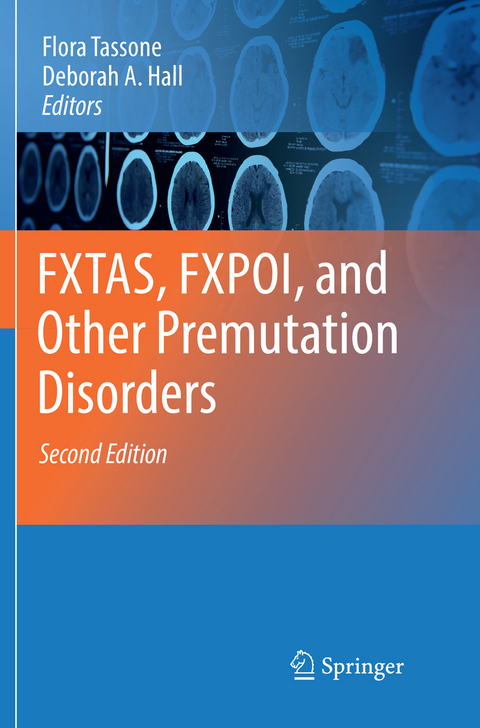
FXTAS, FXPOI, and Other Premutation Disorders
Springer International Publishing (Verlag)
978-3-319-81627-2 (ISBN)
This book should serve as a resource for professionals in all fields regarding diagnosis, management, and counseling of patients with FXTAS, FXPOI and their families, as well as presenting the molecular basis for disease that may lead to the identification of new markers to predict disease risk and eventually lead to target treatments.
The book will present information on all aspects of FXTAS, FXPOI and other premutation disorders including clinical features and current supportive management, radiological, psychological, and pathological findings, genotype-phenotype relationships, animal models and basic molecular mechanisms. Genetic counseling issues are also discussed.
Dr. Flora Tassone, Ph.D., is a Professor in the Department of Biochemistry and Molecular Medicine, and a M.I.N.D. Institute Investigator at the University of California, Davis, School of Medicine. Her research focuses on neurodevelopmental disorders including Fragile X syndrome and associated disorders, Autism spectrum disorders and 22q deletion syndrome. Her expertise is in gene transcriptional and translational regulation. Dr. Tassone has extensive experience in medical genetics and clinical analysis. And she has been granted multiple awards and research awards for her outstanding contributions to the field. Deborah Hall MD PhD is an adult neurologist and movement disorder specialist at Rush University Medical Center in Chicago. She received her MD from Indiana University and her PhD at University of Colorado. She is Director of the FXTAS Clinic at Rush, founder of the Chicago Fragile X Research Group, and works closely with Elizabeth Berry-Kravis in the Fragile X-associated Disorders Program. She has expertise in large epidemiology studies, clinical trials, and human subject's research. She has been conducting research in FXTAS for over 10 years and has published several phenotype and epidemiological papers related to the disorder. In addition, she has a busy clinical practice of movement disorder patients and has a secondary research focus on genetics and clinical trials in Parkinson disease.
1.Clinical Neurological Phenotype of FXTAS.- 2.The Epidemiology of FXTAS.- 3.FXTAS: Neuropsychological and Neuropsychiatric Phenotypes.- 4.Neuroimaging Findings in FXTAS.- 5.The Pathology of FXTAS.- 6.The Molecular Biology of FXTAS.- 7.Genotype/Phenotype Relationships in FXTAS.- 8.Mouse Models for FXTAS and the Fragile X Premutation.- 9.Treatment and Management of FXTAS.- 10.Clinical manifestation and management of FXPOI.- 11.Model systems for understanding FXPOI.- 12.Premutation-Associated Disorders in Childhood and Adulthood.- 13.Genetic Counseling for FXTAS and Fragile X-associated disorders.
| Erscheinungsdatum | 05.03.2022 |
|---|---|
| Zusatzinfo | IX, 293 p. 22 illus., 12 illus. in color. |
| Verlagsort | Cham |
| Sprache | englisch |
| Maße | 155 x 235 mm |
| Gewicht | 4628 g |
| Themenwelt | Medizin / Pharmazie ► Medizinische Fachgebiete |
| Studium ► 2. Studienabschnitt (Klinik) ► Humangenetik | |
| Naturwissenschaften ► Biologie ► Humanbiologie | |
| Schlagworte | Fragile X-Associated Tremor Ataxia Syndrome • Genetic • Molecular Biology • phenotypes • premutation carriers • Primary Ovarian Insufficiency |
| ISBN-10 | 3-319-81627-6 / 3319816276 |
| ISBN-13 | 978-3-319-81627-2 / 9783319816272 |
| Zustand | Neuware |
| Haben Sie eine Frage zum Produkt? |
aus dem Bereich


